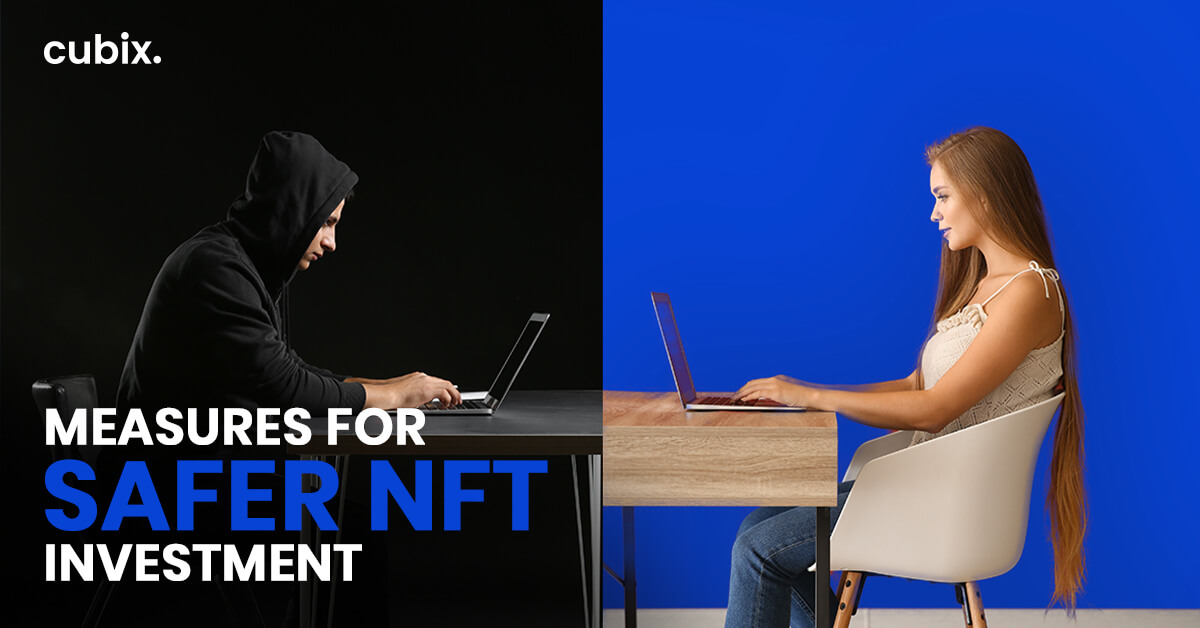NFTs have recently expanded and reshaped the crypto market, with many people incredibly enthusiastic about them thanks to the NFT sale volume reaching US$10.7 billion in the third quarter of 2021. However, while the increasing popularity of NFTs brings a multitude of opportunities for investors, it also attracts sinister opportunists.
Predictably, malicious actors aim to cheat the system for a quick profit.
In the NFT world, deception is a growing problem. As a result, both new and seasoned collectors have incurred losses. Such was the case with the Evolved Apes NFTs, a collection of 10,000 playable characters in a fighting game. The creator, however, ran away with the profits a week after launching the NFTs. And the latest is the Banksy incident, in which bogus Banksy NFTs were offered on OpenSea (an NFT marketplace) and sold for over US$350,000.
NFTs are digital certificates of authenticity/ownership issued on the blockchain to represent an asset, making them a token that can be bought and exchanged. NFTs are unquestionably the next gold mine and a multibillion-dollar venture, but as with any new trend, the NFT market has drawn a slew of fraudsters.
Because they aren't well-understood by the wider population, there are opportunists out there looking to profit from the public's ignorance or misunderstanding. Unfortunately, malicious actors have found the NFT marketplace profitable, and they have been exploiting technological gaps in the system with no signs of slowing down.
There are always new ones popping up, so in this article, we'll look at some of the most well-known NFT incidents so that investors are aware of popular tricks and can stay secure and vigilant at all times.
Popular NFT Deception Tactics To Be Wary Of
1. Replica or Fake NFT Marketplaces
If you want to invest in NFTs, your first step should include determining where you can purchase and trade NFTs. When browsing online, you'll be bombarded with millions of options, yet many of them are bogus NFT trading marketplaces.
To set up a counterfeit NFT marketplace, operatives replicate renowned NFT markets using fake marketplaces with almost identical URLs. These stores seem precisely like the actual NFT marketplaces (i.e., Rarible, OpenSea, and Audius), with a similar site design and also the same NFTs up for sale.
It is a classic NFT incident that has been around for quite some time. It might be hard to differentiate between a deceptive store and a legitimate one since they sometimes appear pretty similar. Unfortunately, there are also counterfeit NFT stores that sell NFTs that don't exist, in addition to duplicates of actual NFT stores. Art collectors are attracted to these fraudulent NFTs, only to learn that they have made a grave error.
These stores, which might appear remarkably identical to the originals, can mislead an expert NFT purchaser into paying substantial sums of money for a counterfeit artwork that is worthless in reality. In addition, hackers are setting up markets where fake artwork is shown to steal private data and capture all the passwords you enter on the sites. For example, fraudsters may ask for your Ethereum wallet's seed phrase (the master key to your cryptocurrency wallet), which they may use to get into your wallet and seize all of your cryptocurrency.
So, how can you prevent falling victim to this well-crafted type of con?
Choosing trustworthy NFT trading platforms is the simplest way to stay secure. Do your homework on the NFT you're interested in beforehand, and make sure the seller is genuine. Additionally, you may examine the NFT's distinctive features. For example, real NFTs will have property displayed, whereas fake NFTs will not.
Keep track of how you landed at the site. Then, if someone shares a fake URL, be sure to report it so that others don't fall for it.
Double-check the contract address of your preferred NFT. It will reveal the location in which it was minted. A fraudulent NFT marketplace may display an inaccurate minting address, while a genuine one will show the precise location.
Always keep in mind the Basic Principle: Never input your seed phrase anywhere other than your original wallet! Also, keep an eye on the domain or URL.
2. Brand Impersonation on Social Media
On social media, the crypto community is highly active. Operatives formed groups that targeted practically every cryptocurrency brand. They can mislead users of their authenticity by using these phony accounts and then offer them fraudulent NFT artworks. It's just another opportunity for them to benefit from selling bogus artwork. Users' personal information is obtained through social media pages and fake brand websites.
The majority of these con artists construct a credible internet identity to offer assistance to worried consumers. For example, in August, an NFT collector named Jeff Nicholas was robbed by a fake OpenSea operator who wiped out his NFT wallet, stealing $480,000 in assets. He had shared his screen for troubleshooting.
So What should you do if you detect a case of brand impersonation?
Brand impersonation may happen to anybody. To avoid being fooled by fake accounts, look for a verification tick next to the username. Also, if you're redirecting to a website, double-check that the address is accurate, and for assistance, contact the official customer support of the NFT trading platforms rather than someone who approached you over social media.
3. Artist Impersonation
Impersonation of artists is another big issue troubling the NFT realm. Fraudsters stole an artist's work and claimed it as their own. One such example is Pranksy, an anonymous NFT collector who spent US$3 million (in nft ethereum) for an NFT believed to be from the actual Banksy artwork.
How can you tell if one NFT artist is impersonating another?
In the world of internet fraud, counterfeits have remained a challenge. So you must be cautious with your purchases. To ensure the safety of your order, make sure the seller you're buying from, and the NFT itself, are both verified.
The most familiar type of artist impersonation NFT incidents happens when someone attempts to sell popular NFTs quicker and cheaper before their profile is removed. Therefore, perform additional research before purchasing anything, and before buying anything, contact the artist or NFT creators if necessary.
4. Giveaway
Theft that involves giveaways and airdrops can be found almost wherever cryptocurrency is. False NFT social media accounts can conduct fake giveaways, leading users to believe they've won significant money.
Operatives target crypto enthusiasts by giving free crypto NFTs associated with NFT marketplaces. Or, masquerading as staff of well-known NFT trading platforms, fraudsters approach you via social media (e.g., Discord or Telegram) claiming to hold giveaway campaigns.
In this fraud, a false NFT account will message individuals, generally on Twitter or Discord, claiming that you have won an NFT. They offer you free NFTs if you circulate the giveaway announcements and sign up for the campaigns via phishing or deceptive NFT websites. And then they steal your credentials if you attempt to link your MetaMask wallet.
Here are a few suggestions to help you stay safe while investing in NFTs.
Operatives spread these schemes through social media platforms such as Twitter, Facebook, Telegram, and Discord. So, while this may seem apparent, do not click on any random links given to you via social media.
Additionally, verify the authenticity of the account that sent you the message. Finally, always check to see if the original artists are minting NFTs. Most artists will promote their NFT sales on their personal virtual spaces and official social media pages (the ticked ones!).
5. Fake Customer Support
Fake customer service or technical assistance is another common fraud strategy, in addition to fake offers in email alerts. Operatives frequently impersonate authentic NFT customer service employees to obtain sensitive information from unsuspecting NFT owners. This is common on Discord and via email.
Operatives pretend to be from OpenSea or another genuine NFT marketplace. They may urge you to share your screen to see what's happening, and unintentionally you end up revealing your cryptocurrency wallet's details.
When you do this, someone can capture screenshots of your wallet's recovery key or the QR code associated with it. Operatives may also send you hoax security alerts concerning your OpenSea account or NFT collection. Finally, they try to get you to click on their disguised phishing link.
The golden guideline for avoiding this deception is to never share your screen with assistance services for diagnosis. Instead, verify official customer service channels on brand websites. Do not respond to DMs claiming to be from a brand if you report the incident on open channels, unless the moderator on the open channel is verified.
Putting It All Together
While frauds and thefts are serious matters to discuss and tackle, the NFT field has grown in popularity over the last year. It's evolved into a place where creators are granted more ownership over their assets and may profit handsomely from them. However, NFTs are still in their infancy as a technology. Therefore, it's necessary to keep up to date on new advances in the industry and new measures you should take to protect what might be precious assets.
NFTs are here to stay, and they will have a significant impact on art, music, and how we conduct business in the years ahead. NFTs have already advanced game development and continue to do so. Therefore, it’s a little worrisome to consider how many various types of baits you may fall for these days. However, if you remain cautious and informed about the kinds of deception that exist and how to spot them, you will remain secure when exploring some amazing NFTs.
Cubix, as an early adopter of NFT technology, will put up efforts to better inform people about NFT technology to help the industry flourish further. If you have any questions concerning NFT, don’t hesitate to reach out.

